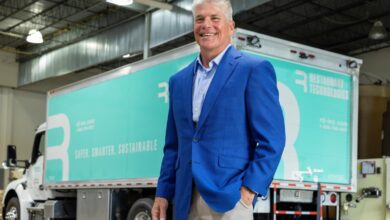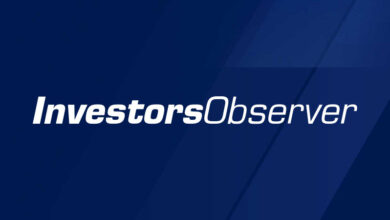The Entrepreneur’s Attorney | School of Law

A penchant for the cutting edge.
In 1989, Brent Britton (’94) was wrapping up a computer science degree at the University of Maine and mulling over his career prospects. He figured he could get a job as a programmer at IBM or Digital Equipment Corp., a typical path for many of his classmates. But Britton had always had a penchant for the cutting edge.
He put himself through college by working as a systems operator at the campus computing center—“those old mainframe computers with the tapes swirling,” he says. But on his own time, Britton dabbled in new technologies. He wrote his first AI program in his junior year and published a digital humor magazine on the university’s primitive networked computer system. When Britton read about a groundbreaking new graduate program at the Massachusetts Institute of Technology, he decided to apply.
Founded just a few years earlier, MIT’s Media Lab sought to bring together bright young innovators in engineering, technology, and design to solve real-world problems. “It was basically advanced computer science and artificial intelligence,” Britton says. “People like [AI and computing pioneers] Marvin Minsky and Alan Kay were there. It was amazing people doing amazing things.”
During Britton’s time at MIT, debates around intellectual property (IP) were coming to the fore. In recent years, a series of legal rulings had established the patentability of certain software-related inventions. “This was ruffling a lot of feathers in ways that I didn’t immediately understand because I had been such a deep math nerd my whole life,” Britton concedes. “I didn’t know a patent from a potato, but it seemed to me that the regulators and the government weren’t speaking the same language as the scientists and engineers. I thought it could be useful for someone like me to learn how the law works and help bridge that gap.”
After earning his master’s degree from MIT, Britton left research behind and headed to BU Law, where he immersed himself in the complexities of intellectual property law. In the last three decades, he has written a book on the fundamentals of IP (Ownability: How Intellectual Property Works, 2013) and cofounded numerous tech start-ups as well as two successful technology law firms. In 2022, he merged his second firm, Tampa-based CoreX Legal, with international firm Bochner Law. Britton stayed on as partner and currently helps lead a group of 40 attorneys in what is now one of the largest intellectual property firms in the southeast.
Britton’s group at Bochner specializes in providing tech entrepreneurs with cradle-to-exit representation—in areas including corporate formation, venture funding, software licensing, IP strategy and prosecution, and dispute resolution. The team boasts a uniquely qualified bench of engineers, scientists, and entrepreneurs and positions itself as a firm built for innovators. “Our lawyers have been in your shoes and walked your journey,” the site reads.
Like Britton, his group’s ethos is irreverent with a bit of an edge. The practice’s landing page declares its trademarked motto in bold, blue lettering: “BE EPIC. BE FEARLESS. BE UNFORGETTABLE.”
“I’ve never been a suit and tie guy,” says Britton, who appears on the company website sporting a black T-shirt, his arms swathed in elaborate tattoos. “The hallmark of my legal career has been to buck the instinct to conform and reject the grayness of the crowd. I do the work that I want to do the way I want to do it.”
Even as a kid growing up in Howland, Maine—a bucolic town of about 1,200—Britton always had a side hustle. He went door to door selling greeting cards in middle school and later deejayed school dances for cash. As an enterprising high school freshman, Britton convinced the school to pay him to run the Howland Job Bank, an agency that connected student workers with tasks like mowing lawns and delivering groceries.
With a strong knack for numbers and tech, Britton was in his element during undergrad and at MIT. BU Law, on the other hand, expanded his aperture. “I hadn’t taken a lot of classes where there was no obvious right answer,” Britton says. “The right answer in law school turned out to be arguing both sides of a question. It was a different way of thinking that was very enriching.”
Britton decided to focus his studies on the intersection of science, tech, and IP, eventually founding the Boston University Journal of Science & Technology Law and publishing it in digital format.
Britton went into law school expecting it to be competitive, even cut-throat, but his experience at BU was the opposite. “It was congenial, with a lot of cool people and wonderful professors,” he recalls. “They were very supportive in really wanting students to be themselves.”
That worked well for Britton, who describes his law school vibe as “a long-haired biker dude” with mirror shades. “It was the ’90s. I was kind of doing the Pearl Jam Eddie Vedder thing.”
During law school, Britton clerked for the Electronic Frontier Foundation, a nonprofit that defends digital civil liberties. After graduation, he moved to San Francisco and toiled briefly as an associate for a Silicon Valley firm before striking out on his own.
In 1997, Britton and two friends formed their own technology law practice. Launching a private firm three years out of law school was audacious, but Britton was sure he understood the tech world better than many lawyers. “It was the dot-com bubble. Everything was going crazy,” he says. “We figured, we know how to do this stuff just as well—and maybe better—than anybody else because so few had done it before.”
Britton Silberman & Cervantez LLP soon matured into a multimillion-dollar practice—one early client was Craig Newmark of Craigslist—and was acquired in 2000 by another Silicon Valley firm. “It wasn’t a retirement-level event,” Britton says, “but I paid off my law school loans and bought my Steinway.”
Britton moved from the West Coast to New York City and practiced technology law for a few years there before settling in Tampa in 2004. (He is admitted to practice in California, Florida, and New York. “That’s 42 hours of bar exams,” he notes dryly.)
In the past three decades, Britton has exuberantly pursued his dual passions of technology innovation and law, with plenty of cross-pollination between the two. Even as he continues to practice law full time, Britton sees himself as an entrepreneur at heart. “I’ve never been one to blindly accept the status quo,” he says. “I’m always interested in how to take a situation and make it better, stronger, faster, more efficient, or, in any case, make it my own.”
Britton has been involved with the launch of dozens of start-ups. To name a few: DealerWizard (“a SaaS [software as a service] that helped car dealers manage inventory”), Lextrovert (“an Etsy for continuing legal education videos”), and VerifIP (“an IP auditing and due diligence tool”). He has enjoyed a handful of profitable exits as well as his fair share of flops.
“There is no limit to what’s coming. Innovation, invention, entrepreneurship—to create and build and grow—these define the very mantle of what it means to be human.”
Like many seasoned entrepreneurs, Britton is sanguine about his failures. Painful mistakes and hard-won lessons now translate into savvy business advice for his legal clients—for example, the absolute necessity of conducting rigorous market validation before bringing a product to market. “I started more than one company based on my assumption of what I thought was a good idea,” Britton says. “But when we launched, it was crickets. Nobody came to the party because I’d never asked the audience what they wanted.”
Britton counsels inventors to rein in their secretive tendencies. “The first thing I tell clients is, sure, take basic steps to protect your IP or source code, but then, get out of stealth mode. Go to the crowd. Share your product. Interview potential customers and ask, ‘Do you like this? Will you pay for it? If not, how should it change?’ That makes all the difference in the success of a start-up.”
As he looks to the future, Britton, like many others, views artificial intelligence as the next frontier of technology law. He predicts that within a few years, practicing law without the use of AI may well be considered malpractice. “AI is not going to replace lawyers yet,” Britton says, “but lawyers who use AI tools are going to powerfully outperform lawyers who don’t.” AI, he says, will be less of a disruption and more of a “creative destruction tsunami.”
And Britton is intent on catching that wave. Among his recent business ventures are two artificial-intelligence-driven start-ups: Idyllic, an AI tool for trademark risk analysis and other legal functions, and Zenzio, an AI-powered sales associate.
Despite the ominous predictions of AI doomsayers, Britton approaches the future with an innovator’s sense of possibility. “I wouldn’t be a lawyer to entrepreneurs if I didn’t deeply believe in the good, kind, and eleemosynary spirit of human beings,” he says. “I’ve always believed that technology and start-up law is the future of everything, and I’ve been right for 30 years. There is no limit to what’s coming. Innovation, invention, entrepreneurship—to create and build and grow—these define the very mantle of what it means to be human.”



